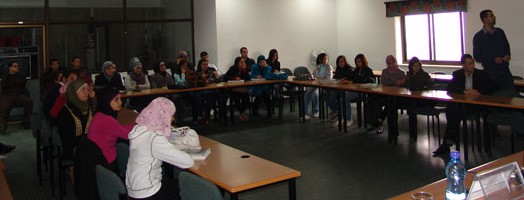The Conceptual Linking Prototype, Potential Use and Enhancement
The Institute of Law at Birzeit University, in cooperation with the Kondrad Adenauer Stiftung, organized a legal encounter on 7 March 2011 entitled the “The Palestinian Labor Law: The Conceptual Linking Prototype, Potential Use and Enhancement”. The encounter was held by the speakers Mr. Mohamad Khader- Legal Researcher at the Institute of Law and Mrs. Buthiana Salem- Director of the Legal Unit at the Ministry of Labor.
At the beginning of the lecture, Mr. Mohammad Khader, welcomed the participants and underscored the importance of the conceptual linking experience in the area of legislation. He mentioned that it is an addition to the Legislation and Court Judgments Database Al-Muqtafi.
He added that after an in-depth study, a methodology of conceptual linking in the field of the Palestinian Labour Law was developed and implemented in reason of the significance of this law for all segments of the society. The experience was phased in levels starting with the identification of sources of information including the Labour Law, executive regulations and pertaining court judgments. The semantic sources were also identified to prepare a list of terms and expressions with legal and semantic significance through a subtle and profound reading of the Labour Law to select the terms that express the law in the best manner. Such terms were labeled as concepts that were rebuilt in a methodological way to express the semantic and legal link thereof; they were linked to the legal texts and court judgments in Al-Muqtafi databases.
In the end of his presentation, he reiterated that the conceptual linking experience as applied to the Palestinian Labour Law will not be the last one as it will be shifted to other laws.
As for Ms. Buthaina Salem, she spoke of the importance of the experience of the IoL’s conceptual linking experience and how it can be used in the area of the reforming the Labour Law and related legislation. She confirmed that this experience expresses an important phase in the development of Al-Muqtafi database. She mentioned that the Ministry of Labour is one of the entities benefiting from this pilot work added to other entities, including Labour Unions, courts adjudicating in labour cases as well as to researchers and legal practitioners working in the area of labour law.
She stressed on the particular features of the Labour Law in terms of the manner it was issued, and the manner it was enforced in 2001. It appeared like a weak law in reason of the environment in which it was enforced and was faced with severe criticisms by workers and employers alike, especially that it did not take into account the economic situation in the labour market when it was drafted. Moreover, it was promulgated in isolation of the Basic Law and included thus general provisions and rules regulated by the basic law. All of such conditions rendered some of its provisions distorted and weak.
Ms. Buthaina reiterated the role of the Ministry of Labour in organizing the labour market and monitoring the implementation of the law. In addition to its vital role in detecting violations, receiving complaints and providing advice by applying developed scientific approaches.
In the end of her presentation, she underlined the significant role played by the conceptual linking pilot project in the area of the labour law. She stated that the labour law regulations are currently being reviewed for better development to protect all parties’ interests, which will have positive effect on the conceptual linking database.










